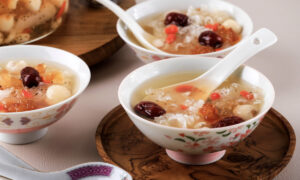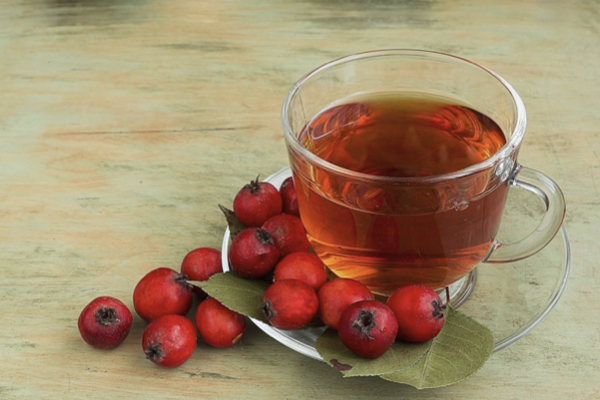Autumn Equinox|What to Eat to Prevent Skin Rashes and Eczema in the Fall
Does the dryness in autumn cause your skin to become uncomfortably dry? In this article, Wong Kwok-wai, a registered Chinese medicine practitioner in Hong Kong, gives some food recommendations that nourish your body and offset the dry air conditions. According to the traditional Chinese calendar, Sept. 23 is the Autumn Equinox, referring to the day on which day and night are equal in length. After that, the days get shorter and the nights get longer in the northern hemisphere. Autumn Equinox is a significant indicator of the change of seasons. After the Autumn Equinox, the weather turns cooler and drier. Wong said that autumn dryness could easily damage our lungs and cause skin and gastrointestinal discomfort. The key to wellness is promoting the production of fluids to moisten dryness and reduce the dryness with humidity to restore our energy. Traditional Chinese Medicine (TCM) practitioners believe that taking good care of our health means we should adapt to natural laws. Wong explained that during springtime and summertime, as the external environment is hotter than our body, we have to exhaust our yang energy (positive force in our body) to strike a balance between our internal body and the external environment, thus, the yang energy needs to be restored. On the other hand, during autumn and winter, as the weather turns drier, we have to exhaust our yin energy (restorative power in our body) to resist the dryness and maintain the internal moisture levels, thus, we need humidity to restore our yin energy. All of these are quoted from the ancient Chinese medical doctrine “Yellow Emperor’s Inner Canon, a saint maintains his Shine (yang) in spring and summer and his Shade (yin) in autumn and winter.” Wong pointed out that autumn dryness can easily damage the lungs, commonly causing respiratory problems such as colds, coughs, and nasal allergies. TCM believes that “the lungs control the skin,” so skin rashes, eczema, dry skin, and hair loss are more common in autumn and winter. TCM also believes that “The lungs affect the large intestine in the digestive system,” so constipation and abdominal pain are more common in autumn as well. To prevent common diseases in autumn, one can nourish yin energy as much as possible, so that our body contains enough water to nourish the lungs, skin, and large intestine; and we should adopt good living habits, such as drinking enough water and going to bed and getting up early. Wong recommends eating more foods that nourish yin energy, nourishes body fluids, and moistens dryness: (1) Foods that nourish yin energy are usually rich in gelatin and have a sticky texture, such as snow fungus, milk, pear, lily, honey, and egg yolk, among others. (2) Foods that produce body fluids and moisten dryness are usually foods with a sour taste, such as strawberry, apple, orange, grape, blueberry, lemon, plum, and hawthorn. Wong also reminded us that the elderly and young children should not eat too much due to their poor spleen and stomach, and they should receive a light amount of Chinese medication or herbs. Hawthorn tea. (Shutterstock)

Does the dryness in autumn cause your skin to become uncomfortably dry? In this article, Wong Kwok-wai, a registered Chinese medicine practitioner in Hong Kong, gives some food recommendations that nourish your body and offset the dry air conditions.
According to the traditional Chinese calendar, Sept. 23 is the Autumn Equinox, referring to the day on which day and night are equal in length. After that, the days get shorter and the nights get longer in the northern hemisphere. Autumn Equinox is a significant indicator of the change of seasons. After the Autumn Equinox, the weather turns cooler and drier.
Wong said that autumn dryness could easily damage our lungs and cause skin and gastrointestinal discomfort. The key to wellness is promoting the production of fluids to moisten dryness and reduce the dryness with humidity to restore our energy.
Traditional Chinese Medicine (TCM) practitioners believe that taking good care of our health means we should adapt to natural laws.
Wong explained that during springtime and summertime, as the external environment is hotter than our body, we have to exhaust our yang energy (positive force in our body) to strike a balance between our internal body and the external environment, thus, the yang energy needs to be restored.
On the other hand, during autumn and winter, as the weather turns drier, we have to exhaust our yin energy (restorative power in our body) to resist the dryness and maintain the internal moisture levels, thus, we need humidity to restore our yin energy. All of these are quoted from the ancient Chinese medical doctrine “Yellow Emperor’s Inner Canon, a saint maintains his Shine (yang) in spring and summer and his Shade (yin) in autumn and winter.”
Wong pointed out that autumn dryness can easily damage the lungs, commonly causing respiratory problems such as colds, coughs, and nasal allergies. TCM believes that “the lungs control the skin,” so skin rashes, eczema, dry skin, and hair loss are more common in autumn and winter. TCM also believes that “The lungs affect the large intestine in the digestive system,” so constipation and abdominal pain are more common in autumn as well.
To prevent common diseases in autumn, one can nourish yin energy as much as possible, so that our body contains enough water to nourish the lungs, skin, and large intestine; and we should adopt good living habits, such as drinking enough water and going to bed and getting up early.
Wong recommends eating more foods that nourish yin energy, nourishes body fluids, and moistens dryness:
(1) Foods that nourish yin energy are usually rich in gelatin and have a sticky texture, such as snow fungus, milk, pear, lily, honey, and egg yolk, among others.
(2) Foods that produce body fluids and moisten dryness are usually foods with a sour taste, such as strawberry, apple, orange, grape, blueberry, lemon, plum, and hawthorn.
Wong also reminded us that the elderly and young children should not eat too much due to their poor spleen and stomach, and they should receive a light amount of Chinese medication or herbs.













